北师大版英语七年级下册电子教案
- 格式:doc
- 大小:20.01 KB
- 文档页数:2
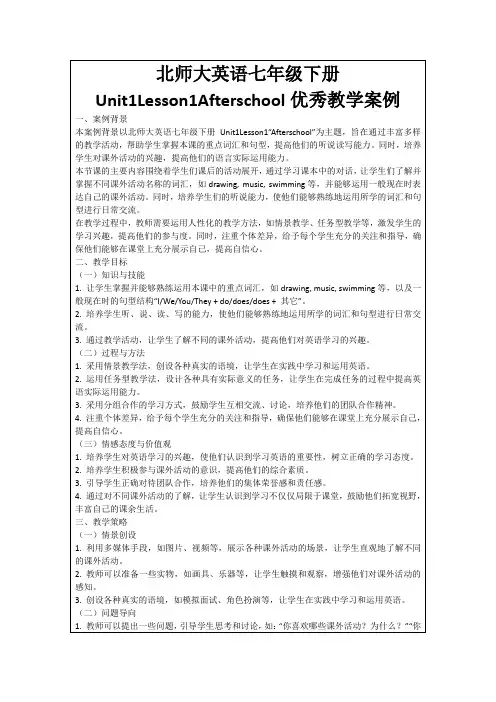
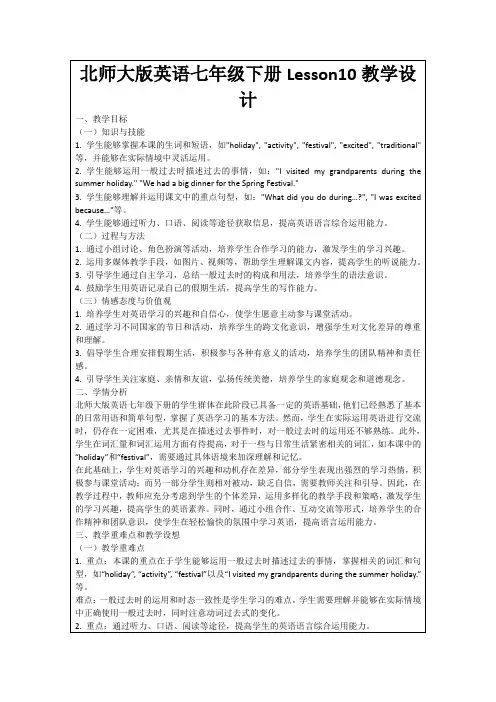
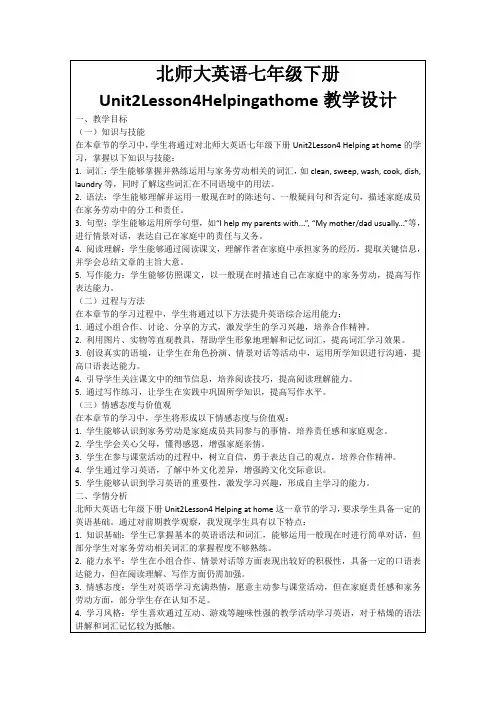
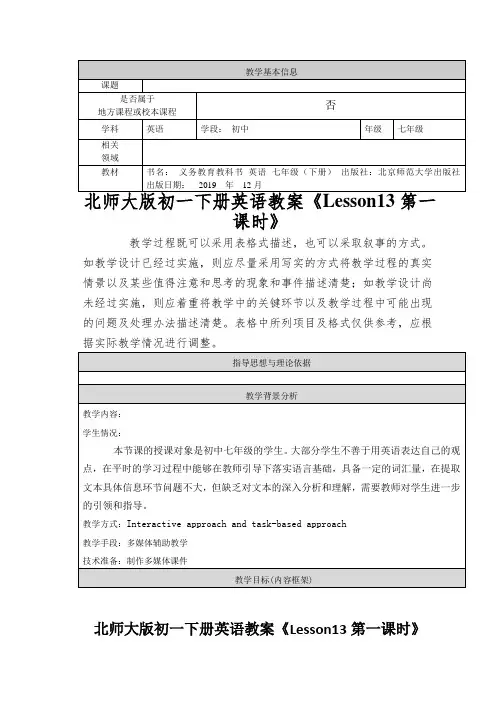
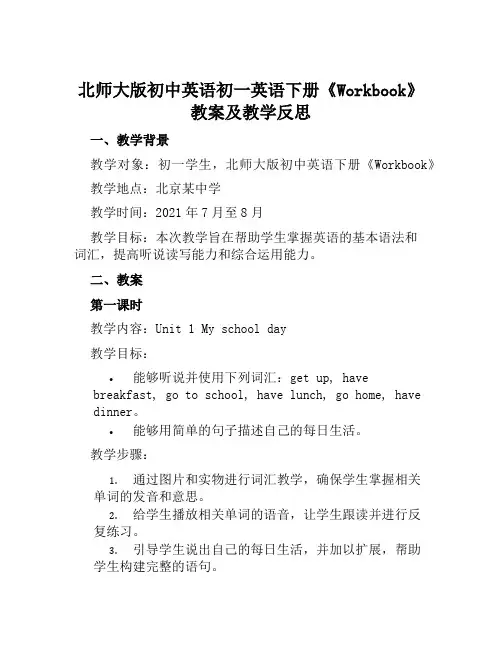
北师大版初中英语初一英语下册《Workbook》教案及教学反思一、教学背景教学对象:初一学生,北师大版初中英语下册《Workbook》教学地点:北京某中学教学时间:2021年7月至8月教学目标:本次教学旨在帮助学生掌握英语的基本语法和词汇,提高听说读写能力和综合运用能力。
二、教案第一课时教学内容:Unit 1 My school day教学目标:•能够听说并使用下列词汇:get up, have breakfast, go to school, have lunch, go home, have dinner。
•能够用简单的句子描述自己的每日生活。
教学步骤:1.通过图片和实物进行词汇教学,确保学生掌握相关单词的发音和意思。
2.给学生播放相关单词的语音,让学生跟读并进行反复练习。
3.引导学生说出自己的每日生活,并加以扩展,帮助学生构建完整的语句。
4.调整课堂氛围,在小组内让学生互相交流自己的生活方式和习惯。
教学反思:本节课主要以词汇和简单的句子为主要内容,通过多种教学手段让学生巩固词汇,提高口语表达能力。
在教学过程中,需要适时调整课堂氛围,让学生积极参与讨论,提高课堂互动效果。
第二课时教学内容:Unit 2 What’s this in English?教学目标:•熟悉并掌握25个形容词及其组合的用法。
•能够较好地进行形容词的识别和应用。
教学步骤:1.继续引导学生巩固上一节课程中所学的动词词汇,然后开始本节的形容词词汇学习。
2.通过图片、视频和互动游戏等多种教学手段,让学生在课堂中体验形容词在不同场合下的表达方式。
3.让学生进行形容词识别的练习,以此来检查他们的掌握情况,并纠正其错误。
4.在语境中,引导学生进行形容词的运用。
教学反思:学生对形容词词汇的掌握速度较快,很快能够辨别出形容词并在日常生活中运用。
在教学中,要注意给学生更多的时间进行讨论和互动,让他们更好地掌握新词汇。
第三课时教学内容:Unit 3 Can you remember them?教学目标:•熟悉并掌握动词过去式。
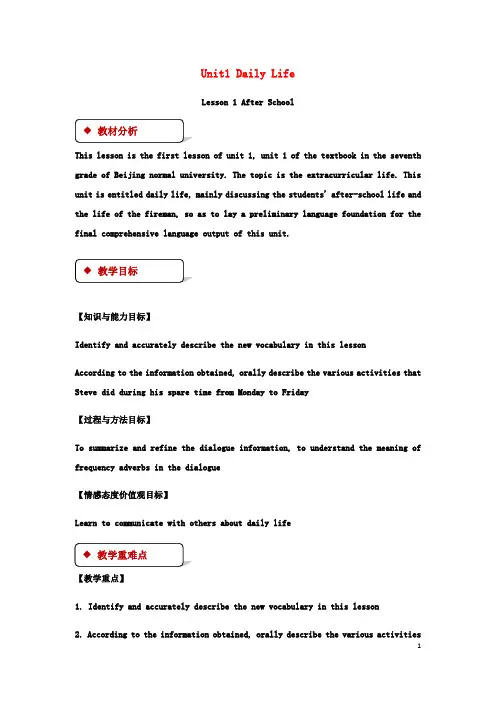
Unit1 Daily LifeLesson 1 After SchoolThis lesson is the first lesson of unit 1, unit 1 of the textbook in the seventh grade of Beijing normal university. The topic is the extracurricular life. This unit is entitled daily life, mainly discussing the students' after-school life and the life of the fireman, so as to lay a preliminary language foundation for the final comprehensive language output of this unit.【知识与能力目标】Identify and accurately describe the new vocabulary in this lessonAccording tothe information obtained, orally describe the various activities that Steve did during his spare time from Monday to Friday【过程与方法目标】To summarize and refine the dialogue information, to understand the meaning of frequency adverbs in the dialogue【情感态度价值观目标】Learn to communicate with others about daily life【教学重点】1. Identify and accurately describe the new vocabulary in this lesson2. According to the information obtained, orally describe the various activitiesthat Steve did during his spare time from Monday to Friday【教学难点】To summarize and refine the dialogue information, to understand the meaning of frequency adverbs in the dialogueTape recorder, MultimediaStepⅠ Lead-inUse pictures to show the state of daily lifeTalk about the pictures. Introduce the topic of this unit to stimulate students' interest in the topic.Such as brush your teeth, do exercises, do your homework, get upStepⅡ Work in pairs.Tell your partner your routines. Ask the students to answer the question.In the morning, I get up, make my bed and have breakfast.In the evening, I do my homework. …StepⅢ Free talkWhat do you often do in a day?Look at the pictures and discuss: What does he do after school?What are some other after-school activities?Guessing gameLanguage points:1.get upget up 意为“起床”。
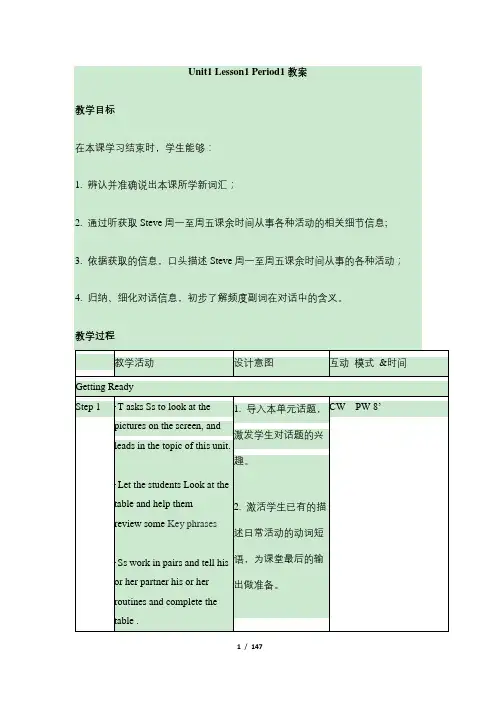
dialogue two times and then complete Steve’s schedule..Ss check the answers in pairs, and then in class.The third listening.Ask Ss circle the letters on the survey..Ask the students to change their answers and then correct the answers.The fourth listeninglisten to the dialogue again and answer the questions 1.When does Steve play basketball?2.What doesn’t Steve do on Wednesday?3.Who does Steve study with?.Ask the students to read the dialogue after the recorder 2. 通过第二遍听,获取有关Steve的课余生活的细节信息,完成表格填写任务并引导学生内化表格中的主要信息和语言。
3. 通过第三遍听,引导学生完成对该对话信息表中频度副词的选择,从而初步获取频度副词在句中的含义和用法。
4.通过第四遍听,引导学生回答问题,从而帮助学生内化对话内容。
Unit1 Lesson1 Period2教案教学目标Unit1 Lesson2 Period1教案教学目标:在本课学习结束时,学生能够:1. 辨认dangerous, difficult, safe等形容词的意义;2. 通过阅读获取有关消防员日常活动的信息;3. 初步体验和感知一般现在时的表意功能和用法;教学过程Unit1 Lesson2 Period2教案教学目标:在本课学习结束时,学生能够:1. 体会一般现在时的基本用法;2. 正确运用含有行为动词的一般现在时的否定形式和主语为第三人称单数时动词的变化;3. 综合运用一般现在时描述父母的日常生活;Unit1 Lesson3 Period1教案教学目标:在本课学习结束时,学生能够:1. 通过阅读,获取有关雷雨天气、火灾、在线聊天的事实和建议等信息;2. 结合文中信息和小组讨论的补充信息给其他同学介绍以上三种情形。
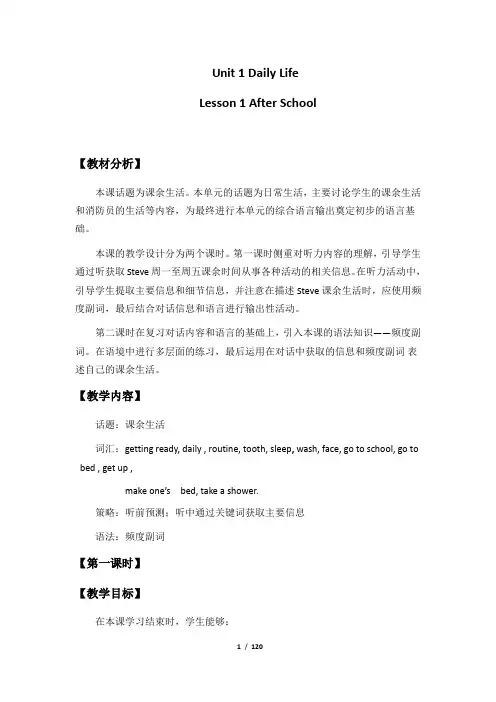
Unit 1 Daily LifeLesson 1 After School【教材分析】本课话题为课余生活。
本单元的话题为日常生活,主要讨论学生的课余生活和消防员的生活等内容,为最终进行本单元的综合语言输出奠定初步的语言基础。
本课的教学设计分为两个课时。
第一课时侧重对听力内容的理解,引导学生通过听获取Steve周一至周五课余时间从事各种活动的相关信息。
在听力活动中,引导学生提取主要信息和细节信息,并注意在描述Steve课余生活时,应使用频度副词,最后结合对话信息和语言进行输出性活动。
21第二课时在复习对话内容和语言的基础上,引入本课的语法知识——频度副词。
在语境中进行多层面的练习,最后运用在对话中获取的信息和频度副词表述自己的课余生活。
【教学内容】话题:课余生活词汇:getting ready, daily , routine, tooth, sleep, wash, face, go to school, go to bed, get up ,make one’s bed, take a shower.策略:听前预测;听中通过关键词获取主要信息语法:频度副词【第一课时】【教学目标】在本课学习结束时,学生能够:【第二课时】Unit 1 Daily LifeLesson 2 A Dangerous Job【教材分析】本课话题为日常活动。
本课的教学设计分为两个课时。
第一课时侧重处理对文段的阅读,引导学生通过阅读,获取并整理有关消防员日常活动的主要信息及细节信息,最后结合课文的信息和语言进行输出性活动。
在第一课时,学生还要学习词汇,并初步感知语法一般现在时的用法和意义。
21第二课时在对课文的语言和内容进行复习的基础上,引导学生归纳总结本课的语法:一般现在时,通过观察和分析例句,关注含有行为动词的一般现在时的肯定否定结构及主语为第三人称单数时动词的变化。
最后运用本课所学语法内容,并结合本课话题,描述父母一天的日常活动。
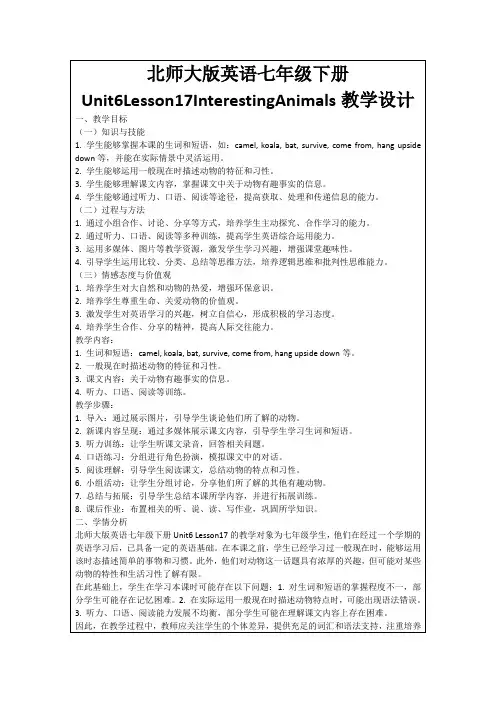
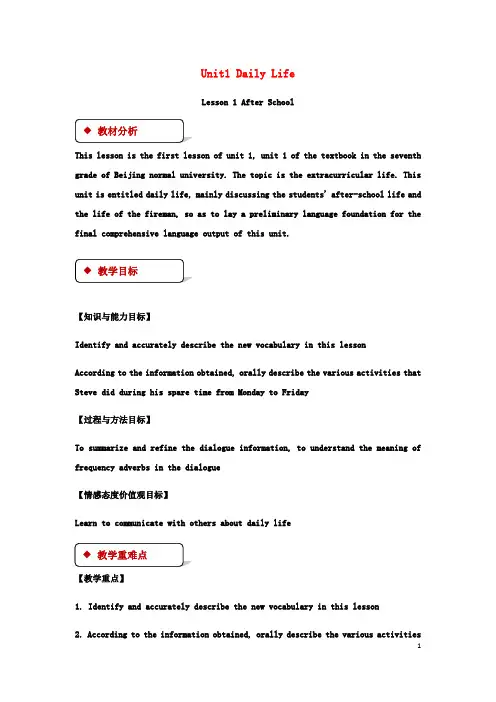
Unit1 Daily LifeLesson 1 After SchoolThis lesson is the first lesson of unit 1, unit 1 of the textbook in the seventh grade of Beijing normal university. The topic is the extracurricular life. This unit is entitled daily life, mainly discussing the students' after-school life and the life of the fireman, so as to lay a preliminary language foundation for the final comprehensive language output of this unit.【知识与能力目标】Identify and accurately describe the new vocabulary in this lessonAccording tothe information obtained, orally describe the various activities that Steve did during his spare time from Monday to Friday【过程与方法目标】To summarize and refine the dialogue information, to understand the meaning of frequency adverbs in the dialogue【情感态度价值观目标】Learn to communicate with others about daily life【教学重点】1. Identify and accurately describe the new vocabulary in this lesson2. According to the information obtained, orally describe the various activitiesthat Steve did during his spare time from Monday to Friday【教学难点】To summarize and refine the dialogue information, to understand the meaning of frequency adverbs in the dialogueTape recorder, MultimediaStepⅠ Lead-inUse pictures to show the state of daily lifeTalk about the pictures. Introduce the topic of this unit to stimulate students' interest in the topic.Such as brush your teeth, do exercises, do your homework, get upStepⅡ Work in pairs.Tell your partner your routines. Ask the students to answer the question.In the morning, I get up, make my bed and have breakfast.In the evening, I do my homework. …StepⅢ Free talkWhat do you often do in a day?Look at the pictures and discuss: What does he do after school?What are some other after-school activities?Guessing gameLanguage points:1.get upget up 意为“起床”。
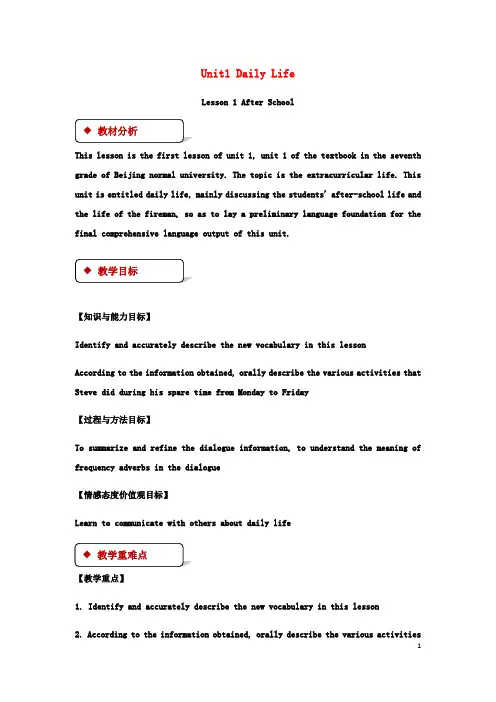
Unit1 Daily LifeLesson 1 After SchoolThis lesson is the first lesson of unit 1, unit 1 of the textbook in the seventh grade of Beijing normal university. The topic is the extracurricular life. This unit is entitled daily life, mainly discussing the students' after-school life and the life of the fireman, so as to lay a preliminary language foundation for the final comprehensive language output of this unit.【知识与能力目标】Identify and accurately describe the new vocabulary in this lessonAccording tothe information obtained, orally describe the various activities that Steve did during his spare time from Monday to Friday【过程与方法目标】To summarize and refine the dialogue information, to understand the meaning of frequency adverbs in the dialogue【情感态度价值观目标】Learn to communicate with others about daily life【教学重点】1. Identify and accurately describe the new vocabulary in this lesson2. According to the information obtained, orally describe the various activitiesthat Steve did during his spare time from Monday to Friday【教学难点】To summarize and refine the dialogue information, to understand the meaning of frequency adverbs in the dialogueTape recorder, MultimediaStepⅠ Lead-inUse pictures to show the state of daily lifeTalk about the pictures. Introduce the topic of this unit to stimulate students' interest in the topic.Such as brush your teeth, do exercises, do your homework, get upStepⅡ Work in pairs.Tell your partner your routines. Ask the students to answer the question.In the morning, I get up, make my bed and have breakfast.In the evening, I do my homework. …StepⅢ Free talkWhat do you often do in a day?Look at the pictures and discuss: What does he do after school?What are some other after-school activities?Guessing gameLanguage points:1.get upget up 意为“起床”。
北师大版英语七下 Lesson 14 My First Day 教学设计1一. 教材分析北师大版英语七下Lesson 14 My First Day是一篇关于学生第一天在学校发生的事情的课文。
课文主要描述了学生Mary的第一天,包括她遇到的同学、上的课程以及她的感受。
通过这篇课文,学生可以了解到学校生活的方方面面,同时提高他们的阅读理解和口语表达能力。
二. 学情分析学生在进入七年级下学期时,已经具备了一定的英语基础,能够进行简单的口语交流和书面表达。
然而,对于一些较复杂的语法结构和词汇,他们可能还需要进一步的引导和练习。
因此,在教学过程中,我们需要关注学生的个体差异,充分调动他们的积极性,引导他们主动参与课堂活动。
三. 教学目标1.知识目标:学生能够掌握课文中的关键词汇和短语,如“first day”,“new friend”, “have a good time”等。
2.能力目标:学生能够理解课文内容,提高阅读理解能力;能够运用所学词汇和短语进行口语交流和书面表达。
3.情感目标:学生能够尊重和理解他人的不同经历,培养良好的团队合作精神。
四. 教学重难点1.重点:课文中的关键词汇和短语。
2.难点:动词时态的运用,如一般过去时。
五. 教学方法采用任务型教学法、情境教学法和分组合作学习法。
通过设置各种任务和情境,引导学生主动参与课堂活动,提高他们的口语表达能力和团队合作能力。
六. 教学准备1.课文课件或黑板。
2.学生用书和练习册。
3.相关图片或实物。
七. 教学过程1.导入(5分钟)通过提问方式引导学生回顾已学过的关于学校生活的知识,如课程、同学等。
同时,让学生分享他们自己的第一天上学的故事。
2.呈现(10分钟)利用课件或黑板,展示课文中的关键词汇和短语,如“first day”, “new friend”等。
同时,引导学生关注动词时态的运用,如一般过去时。
3.操练(10分钟)将学生分成小组,进行角色扮演活动。
Unit 1 Daily Life Lesson 1 After School教案教学内容:北师大版英语七年级下册Unit 1 Daily Life Lesson 1 After School部分内容。
教学目标(Objectives):1.确保学生认识和理解一些基本单词的意义和简单口头运用(To learn the meaning and simple usages of some words and phrases)。
2.学习使用本单元重点句型及表达(To use the typical sentences to express)。
3.鼓励学生大胆发言及表达(To encourage the students to express bravely)。
4.培养学生对英语学科的兴趣(To make the students interest in English learning)。
5.增强学生听说读写译的能力(To strengthen the ability of listening, speaking, reading, writing and translating)。
教学重点(Key Points):在学习了单词的基础上,以单词为载体,进行主要句型的学习,并了解其中的语法现象,根据具体情境,学会交流对话,侧重句型语法学习,交际意向和课外拓展为重点。
教学方法:游戏,音频,情景教学法,Pair-work两人小组活动,Group-work小组活动,多媒体辅助教学。
教学难点:学生处于初中阶段,对英语有了初步了解,有了一定的词汇储备,对于七年级下学期学生的要求重点是在会读会说的基础上,能掌握一些基本单词的拼写和造句,了解一定的语法内涵,与人进行简单沟通交流。
教学准备:课件、照片素材、音频文件、教学道具。
教学设计:Step1. GreetingStep2.Warm-up/Leading(热身/课程导入)Warm-up Question1)What do you do after school? Discuss in groups and make a list.(eg: read books , play basketball)2)After-school Activities Survey:How often do you play sports after school?How often do you do homework with your friends?How often do you watch TV in the evening?...Step3.Presentation(呈现新课)1.Words Learning!1)老师放映课件,用中文询问同学看到了什么?同学们会看到课件上呈现的图画。
Unit 5 Now And ThenLesson 13 Changes in Our Town本课是北师大版《初中英语》教材七年级下册第五单元第十三课,课题是Changes in Our Town 。
本课为第一课时,是一篇祖孙间展开的关于“小城面貌和生活的今昔对比”的对话语篇。
本节课一方面训练学生获取和分析具体信息及归纳提炼主旨要义的能力,另一方面引导学生初步感知be 动词一般过去时的用法和意义。
第二课时在复习课文语言和内容的基础上,引导学生归纳总结本课的语法:be 动词一般过去时的基本用法,通过观察和分析例句,关注含有be 动词的一般过去时的肯定否定结构及副词too 和either 的用法。
【知识与能力目标】1. Key vocabulary2. Key structures:【过程与方法目标】1通过阅读,获取关于“城市、建筑、人、交通、商店”等五方面社区变化的具体信息以及情绪和情感信息;2. 在阅读中,关注并归纳be 动词一般过去时的基本用法;3. 使用be 动词一般过去时简单描述自己家乡的变化【情感态度价值观目标】通过对比过去和现在,感受时间的珍贵。
【教学重点】提取关于“城市、建筑、人、交通、商店”等五方面变迁的具体信息,同时关注并归纳be 动词一般过去时的基本用法。
【教学难点】如何引导学生对文本信息进行深入思考,以及如何在设置的语境中使用be 动词一般过去时简单描述自己家乡的变化。
Tape recorder, MultimediaStep 1. BrainstormShow a picture of a city which has changed a lot and ask some questions.Step 2. Warm-upIntroduce the Key Adjectives and then play the recording of them. Show pictures to help the students put the adjectives in opposite pairs and then describe the pictures with the Key Adjectives.Step 3. Pre-reading1. Play the recording of the dialogue and ask the students to read aloud with the speaker. Show the students the table and help them recall the changes in the town and ask them to work in pairs and talk about the changes in the town. Get the students to have a free talk about the changes in their hometown or Mentougou. Help the students look at the changes correctly. Show the students some pictures and some sayings about time to get them to learn to tr2. Introduce the postcard, and give them the questions. And then play the tape for them.Go over the questions and listen to the tape to get the answers.3.Check the answers.Step 4. Reading1st reading: Ask the students to focus on the beginning to find out the correct answers to the two questions. Who are talking? What are they talking about?2nd reading: Show the students how to find out the key words to complete the dialogue. Call back the answers in a whole-class setting.3rd reading: Ask the students to read and find out the 5 aspects they mentioned in the dialogue. And then complete the table.Step 5. Talk about your homework.Talk about:the city, buildings, people, traffic, shops, your house, the schools, theroads/streets, the restaurant, the park…Step 6 Group talk:You can use the following sentences to describe the changes about school, room, teacher, parents, classmates and town.For example,The trees are ______ now, but they were _______ before. The canteen is _____ now, but it was __________before. The building is _____now, but it was ___________before. Step 7 Homework1.To read the dialogue aloud.2. To write a passage about the changes of your hometown.略。
北师大七下英语教案全册第一单元:人教版七年级下册初中英语教案Unit 1Lesson 1:HelloTeaching Objectives- Enable students to greet each other in English- Introduce the names of days in a week- Understand the meaning of the key vocabularyTeaching Steps1. Greeting: Greet students and introduce yourself2. Warm-up: Play a song that introduces the days of the week3. Presentation: Show pictures of the days of the week and teach their names in English4. Practice: Have students practice pronouncing the days of the week5. Vocabulary: Teach the key vocabulary words and their meanings6. Role-play: Divide students into pairs and have them role-play a dialogue using the key vocabulary7. Consolidation: Review the lesson and ask students questions to assess their understanding8. Homework: Assign exercises from the textbook for further practiceTeaching Materials- Textbook: Unit 1, Lesson 1- Pictures of the days of the week- Song about the days of the week第二单元:人教版七年级下册初中英语教案Unit 2 Lesson 1:My SchoolbagTeaching Objectives- Introduce school supplies in English- Enable students to describe their school bags- Understand the meaning of the key vocabularyTeaching Steps1. Greeting: Greet students and review the previous lesson2. Warm-up: Show pictures of school supplies and have students name them in English3. Presentation: Teach the names of school supplies in English4. Practice: Have students describe their school bags using the key vocabulary5. Vocabulary: Teach the key vocabulary words and their meanings6. Role-play: Divide students into pairs and have them role-play a dialogue about their school bags7. Consolidation: Review the lesson and ask students questions to assess their understanding8. Homework: Assign exercises from the textbook for further practiceTeaching Materials- Textbook: Unit 2, Lesson 1- Pictures of school supplies- Flashcards of the key vocabulary words... (继续添加其他单元和课时的教案)总结本教案为北师大七下英语教案全册的概述,包括第一单元和第二单元的教学目标、教学步骤和所需教材。
北师大版英语七下 Lesson 13 Changes in Our Town 教学设计1一. 教材分析Lesson 13 Changes in Our Town 是一篇关于家乡变化的文章。
文章描述了作者家乡的过去和现在,以及家乡发生的一些变化。
文章内容包括学校的变化、商店的变化、医院的变化等。
通过对比过去和现在,文章展示了家乡的发展和进步。
本节课的主要目的是让学生能够理解文章内容,提高阅读能力,并能够运用所学知识进行口头表达和写作。
二. 学情分析学生在进入七年级下学期时,已经具备了一定的英语基础,能够进行简单的口语交流和阅读理解。
但是,对于一些复杂的词汇和句子结构,学生可能还不太熟悉。
因此,在教学过程中,需要注重词汇的讲解和句型的操练,帮助学生更好地理解和运用所学知识。
三. 教学目标1.能够理解文章内容,把握文章的主旨大意。
2.能够运用过去时和现在时进行对比表达,描述家乡的变化。
3.能够提高阅读理解能力,能够快速寻找文章中的关键信息。
4.能够通过小组合作,进行口头表达和写作练习。
四. 教学重难点1.词汇:school, hospital, shop, farm, factory等2.句型:1. Our school has a new library. 2. There was a post office nearthe square, but it’s gone now. 3. There are some new houses and a bigsupermarket near my home.3.时态:过去时和现在时的对比表达五. 教学方法1.任务型教学法:通过设置各种任务,让学生在实践中学习和运用英语。
2.合作学习:通过小组合作,提高学生的口头表达能力和团队协作能力。
3.情景教学法:通过设定情景,让学生在实际情境中学习和运用英语。
六. 教学准备1.教材:北师大版英语七下Lesson 13 Changes in Our Town2.多媒体教学设备:电脑、投影仪等3.教学课件:PPT等4.练习题:相关阅读理解练习题和写作练习题七. 教学过程1.导入(5分钟)利用多媒体展示一些家乡的变化图片,引导学生谈论家乡的变化,激发学生的学习兴趣。
7年级英语北师大版教案下册教案标题:7年级英语北师大版教案下册教案目标:1. 帮助学生掌握下册所学英语知识和技能。
2. 提高学生的听、说、读、写能力。
3. 培养学生的英语学习兴趣和自主学习能力。
教学重点:1. 学习并掌握本册单元的重点词汇和短语。
2. 理解并运用本册单元的语法知识。
3. 提高学生的听力和口语表达能力。
教学难点:1. 学生对新课文的理解和运用能力。
2. 学生的口语表达能力的提高。
教学准备:1. 教材:7年级英语北师大版教材下册。
2. 多媒体设备。
3. 学生练习册和笔记本。
教学过程:一、导入(5分钟)1. 利用图片或视频引入新课,激发学生学习兴趣。
2. 通过简单的口语交流,复习上节课所学内容。
二、新课讲解(15分钟)1. 介绍本课的话题和目标。
2. 通过多媒体展示课文内容,引导学生理解课文。
3. 解释生词和重点短语,并进行示范。
4. 教授本课的语法知识,并进行相关练习。
三、听力训练(10分钟)1. 播放课文录音,要求学生仔细听并回答问题。
2. 分组进行听力对话练习,培养学生的听力理解能力。
四、口语练习(15分钟)1. 针对本单元的口语任务,组织学生进行角色扮演、小组讨论等活动。
2. 提供实际情境,让学生运用所学知识进行口语表达。
五、阅读训练(10分钟)1. 让学生阅读课文,并回答相关问题。
2. 组织学生进行小组阅读活动,提高学生的阅读理解能力。
六、写作练习(10分钟)1. 引导学生根据所学内容进行写作练习,如写一篇日记、写一封信等。
2. 对学生的写作进行评价和指导,帮助他们提高写作能力。
七、复习总结(5分钟)1. 复习本节课所学的重点内容。
2. 梳理本单元的知识点,帮助学生进行知识整合和巩固。
八、作业布置(5分钟)1. 布置课后练习,巩固本课所学内容。
2. 提醒学生预习下节课内容。
教学反思:1. 教学过程中,要注重学生的参与和互动,激发他们的学习兴趣。
2. 针对学生的不同水平和需求,灵活调整教学方法和内容。
北师大版英语七年级下册
Unit1 Daily life
Getting ready
1.brush one’s teeth 刷牙
2.do exercises 做操,做练习
3.do one’s homework 做作业
4.get up 起床
5.go to bed /go to sleep 上床睡觉
6.go to school 上学
7.have breakfast 吃早餐
8.have lunch 吃午餐
9.have dinner 吃晚餐
10.have classes 上课
11.make one’s bed 整理床铺
12.play sports/do sports 做运动
13.take a shower 淋浴
14.wash one’s face 洗脸
15.watch TV 看电视
16.do the housework 做家务
17.empty the rubbish bins 倒空垃圾箱
18.go shopping/do some shopping 去购物
19.play cards 打牌
20.study for tests 备考
21.tidy one’s room 整理房间
22.wash the dishes 洗盘子
23.wash the clothes 洗衣服
After school
1.do a survey 做调查
2.after-school activities 课外活动
3.help sb. (to) do sth. 帮助某人做某事
4.what about/how about 怎么样?
5.finish the homework early 早完成作业
6.watch a football match 观看足球比赛
7.sing songs 唱歌
8.read history books 看历史书
9.listen to pop music 听流行歌曲
10.go running 去跑步
11.go to the cinema 去电影院
12.give homework 留作业。